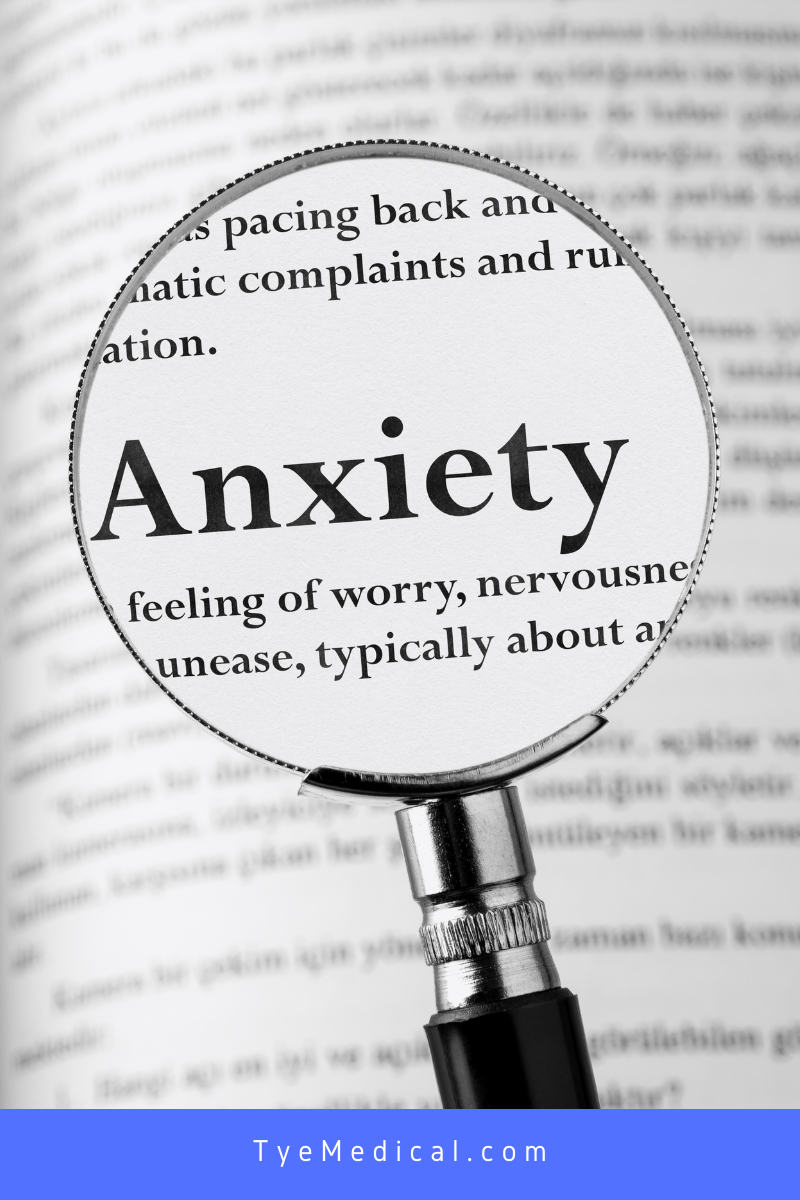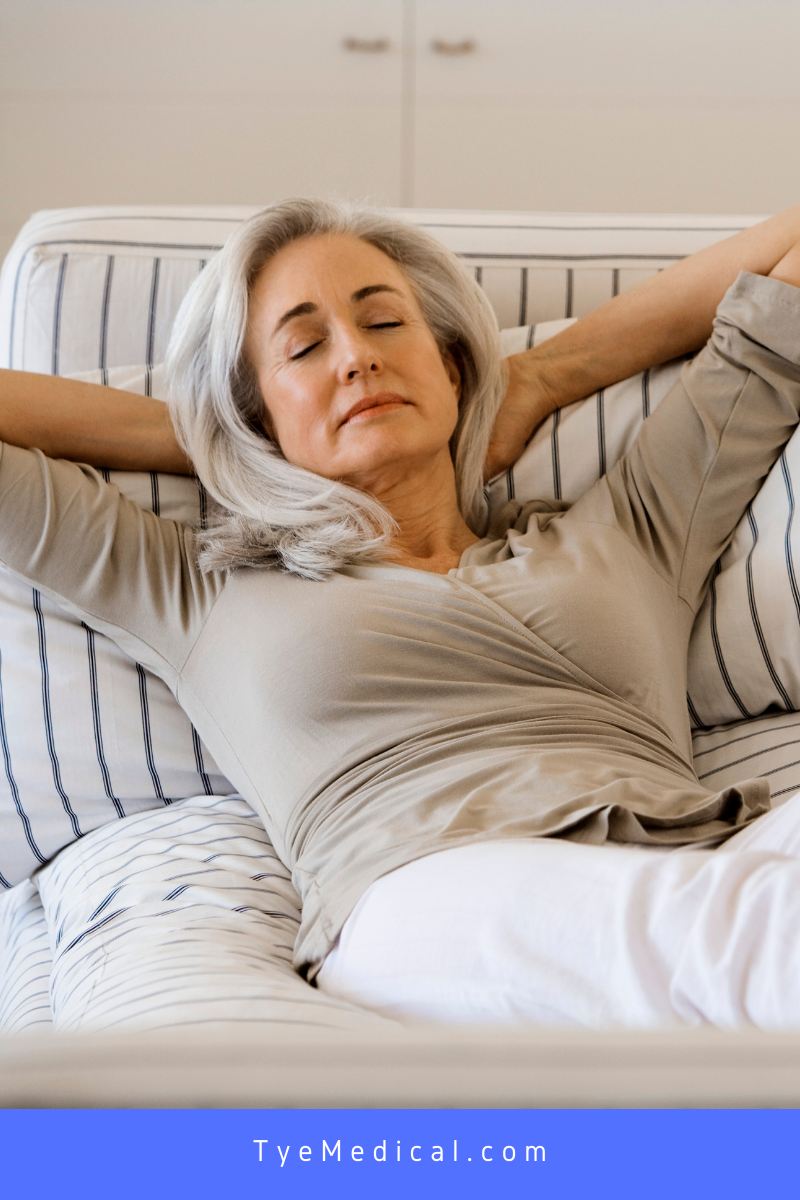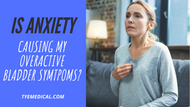Understanding the Link Between Anxiety and Overactive Bladder (OAB)
Written by Tye Medical on Mar 14th 2021
If you experience urinary frequency or bladder leaks, then you probably realize that anxiety and overactive bladder (OAB) are close friends. After all, who isn’t a little anxious about leaking or finding a bathroom in time? The fact that OAB causes some anxiety isn’t at all surprising. But did you realize that the reverse can also be true?
A study published in the U.S. National Library of Medicine found that 48% of OAB patients participating in the study had anxiety symptoms and 24% had moderate to severe anxiety. Those with OAB reported notably higher instances of anxiety than the control group. While it’s true that there are several causes for overactive bladder (see below), anxiety is a key component for some people and might be exacerbating existing issues.
What Is the Difference Between Stress and Anxiety?
The primary difference between stress and anxiety is where it comes from. Stress is triggered by something external – like financial or relationship problems. Although it’s triggered from the outside, it’s felt inside your body. On the other hand, anxiety is your internal reaction to the stress you experience. When undergoing stress (or external pressure), you might begin to feel uneasy or fearful. This means you’re experiencing negative feelings in both your body and mind – that’s anxiety. Chronic stress often leads to frequent feelings of anxiousness.
If you’d like more information on dealing with stress, refer to our article, Stress Management for Seniors: Tips for Improving Health and Wellbeing.
How Do Stress and Anxiety Impact the Bladder?

Anxiety and an overactive bladder can occur simultaneously. Stress and anxiety affect the bladder in several ways. Both cause muscles in your body to tense up (mostly due to increased adrenaline), and the bladder is essentially a muscular sac that also tightens with stress. Additionally, your pelvic floor is comprised of muscles that can tighten, compressing your bladder. Chances are that when your body tenses up, so does your pelvic floor and bladder. This triggers the need to urinate, and if you’re anxious often, you might need to go too often.
Can Anxiety Cause Incontinence?
We’ve established that it’s not uncommon for anxiety and overactive bladder to occur together (with anxiety at least contributing to OAB). But what about incontinence and OAB? Can anxiety cause you to lose control over your bladder? Yes – but it’s rare. This would happen if you experience peak anxiety that puts you deep into fight-or-flight mode. At that point, your limbic system (which regulates bodily systems necessary for survival) takes over. When the anxiety reaches its peak, your limbic system might decide it’s unable to support all your necessary functions and shut down the area that controls your bladder – triggering temporary incontinence.
Incontinence triggered by extreme anxiety is more common in people with severe phobias. In rarer cases, it can happen to those suffering from panic disorder and PTSD.
What Are the Other Causes of OAB?
Even though it’s common to experience both anxiety and overactive bladder, other causes of OAB exist. However, if you discover a different cause, remember that stress and anxiety will almost always aggravate your symptoms.
If you have an overactive bladder, it means that your bladder muscles contract or spasm involuntarily even when it isn’t adequately full. Sometimes this is due to underlying conditions, and other times the cause is unknown. Urine leaks happen depending on how the sphincter muscles (that control urine flow) react to the contractions.
Common OAB causes include:
- Pelvic organ prolapse – When one or more pelvic organs, like the bladder drop out of place due to a weakened pelvic floor. This often places additional pressure on the bladder.
- Weakened pelvic/bladder muscles – Even without a prolapse, your pelvic floor cam droop enough to diminish bladder support and cause pressure.
- Low estrogen levels (usually after menopause) – Hormone-related changes weaken pelvic floor ligaments and urethra muscles and makes the bladder lining very sensitive, triggering the need to urinate before the bladder is full.
- Enlarged prostate – Sometimes an enlarged prostate presses on the bladder causing OAB symptoms.
- Nerve damage – When the nerves that control bladder emptying are damaged.
- Neurocognitive disorders – When Parkinson’s disease, stroke, multiple sclerosis, or Alzheimer’s disease affect bladder emptying.
- Incomplete bladder emptying – Also known as bladder retention, occurs when your bladder doesn’t empty completely even when it’s full. Because it’s never adequately empty, it feels full more quickly, leading to frequent urination.
Overactive Bladder and Irritable Bowel Syndrome (IBS)
According to the Anxiety and Depression Association of America, about one in five U.S. adults have IBS. Symptoms include cramping, bloating, abdominal pain, gas, diarrhea, and constipation. Studies have found that anxiety also contributes to IBS. Over 33% of test subjects with OAB also had IBS (simultaneously). Anxiety and overactive bladder are not uncommon in those with IBS.
Why is this so? Well, it depends on who you ask. Traditional medicine has been unsure of the connection. Some theorize that muscles and nerves in both the urinary tract and colon are dysfunctional.
However, in recent years the medical world has gained an increased understanding of the brain-gut connection. According to Harvard Health Publishing, “The gastrointestinal tract is sensitive to emotion. Anger, anxiety, sadness, elation – all of these feelings (and others) can trigger symptoms in the gut.” The gut refers to the digestive tract, and in the context of gut health, typically refers to the stomach, small intestine, and colon.
Your gut and brain send signals back and forth to each other, so when anxiety takes over, your gut knows it and reacts, disrupting digestion and causing intestinal distress.
This means that chronic anxiety can cause or exacerbate both bladder and intestinal problems like IBS at the same time.
How Can I Manage Anxiety and Overactive Bladder Symptoms?

1. Recognize Anxiety Symptoms
First, it’s important to recognize the difference between feeling relaxed and anxious. So pay attention to both the physical and mental symptoms of anxiety.
Physical Symptoms of Anxiety
- Feeling tense and jumpy
- Tightness in stomach
- Upset stomach
- Muscle tension (especially shoulders and core)
- Sweating
- Headaches
- Pounding heart
- Dizziness
- Shortness of breath
- Holding breath unintentionally
- Shaking/trembling
Mental/Emotional Symptoms of Anxiety
- Feelings of dread, apprehension, or nervousness (may experience these feelings physically in your stomach and chest)
- Irritability
- Feeling that your mind is blank
- Difficulty concentrating
- Feelings of fear as you anticipate the worst
- Desire to avoid anxiety triggers
For more information about anxiety and how it presents in seniors, check out our article 10 Facts About Anxiety and How It Affects Senior Adults.
2. Stop and Address Underlying Emotions
You can adapt and grow accustomed to living with heightened levels of anxiety (without knowing it). While that might sound great – it’s not. Over time, this takes a serious toll on your physical and mental health and is likely contributing to your OAB. If you want to improve both anxiety and overactive bladder, you must stop when you recognize anxiety symptoms.
Consider the cause of your immediate anxiety. Is it an external pressure, an internal pressure (i.e. expecting too much of yourself), or some combination of the two? Address the underlying issues. Sometimes, there’s real trauma and hurt underneath the anxiety, self-pressure, or negative thinking. If this is true for you, consider consulting with a professional counselor to uproot those painful causes of emotions that trigger your anxiety feelings. Under the guidance of a licensed therapist, you could investigate a wide variety of treatment options, such as regular counseling, group work, or medication. Less traditional methods such as pet therapy have also proven effective in managing and reducing anxiety symptoms.
3. Take Deep Breaths and Relax Your Body
While you invest time in uprooting the underlying cause of anxiety, it’s also important that you address the physical symptoms through deep-breathing exercises and relaxation. If you’re at work, you might need to take a five-minute break. Inhale slowly but deeply through your nose, hold for a few seconds, and slowly exhale through your mouth. The increased oxygen to your brain activates the parasympathetic nervous system, which promotes calmness throughout your body. Here are some other deep-breathing techniques to try.
Additionally, pinpoint tense muscles by tightening then relaxing different muscle groups. Raise your shoulders to your ears and then slide them down and back. Many times, stress and anxiety cause you to tighten your shoulder muscles and draw them upwards. Similarly, be sure you’re not clenching your core or pelvic floor muscles. Relax your abdominals and on your next deep breath, inhale down into your lower abdomen. This relaxes your pelvic floor muscles. As you reduce physical stress symptoms, you’re combating both anxiety and overactive bladder.
4. Try Yoga
On this blog, we’ve recommended yoga for several conditions and issues, and it’s an important tool for decreasing anxiety and overactive bladder symptoms. Yoga routines help you become aware of your body – whether it’s relaxed or tense. It clears your mind and helps you focus only on your breathing and the poses. Since the routines are accompanied by targeted deep breathing, you receive additional stress-relieving benefits. You can join an in-person class or download the Down Dog Yoga app for free. Be sure to discuss a new exercise routine with your doctor and begin with less strenuous routines.
5. Incorporate Prayer or Meditation
People who include a quiet time that focuses on a loving and protective God are less likely to experience anxiety-related disorders like fear, self-consciousness, social anxiety, or obsessive-compulsive disorder. For those who don’t ascribe to this type of spiritual belief, meditation also works well to reduce feelings of stress and anxiety by guiding the mind to focus on the moment and recognize thoughts and feelings without judgment or fear. Follow the link for more information on meditation and anxiety.


